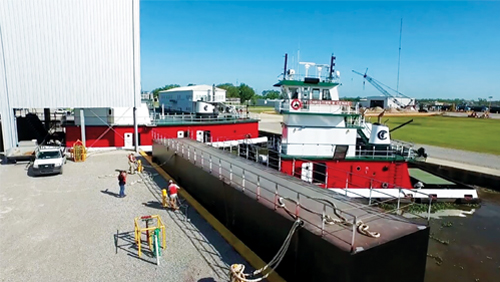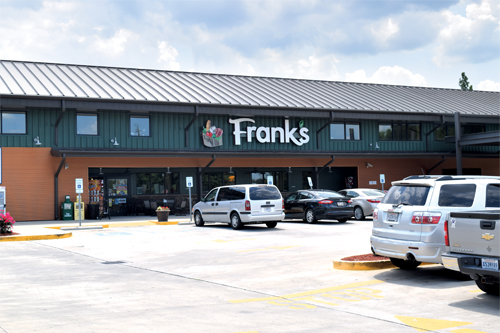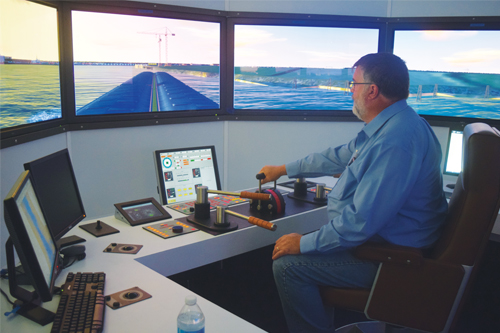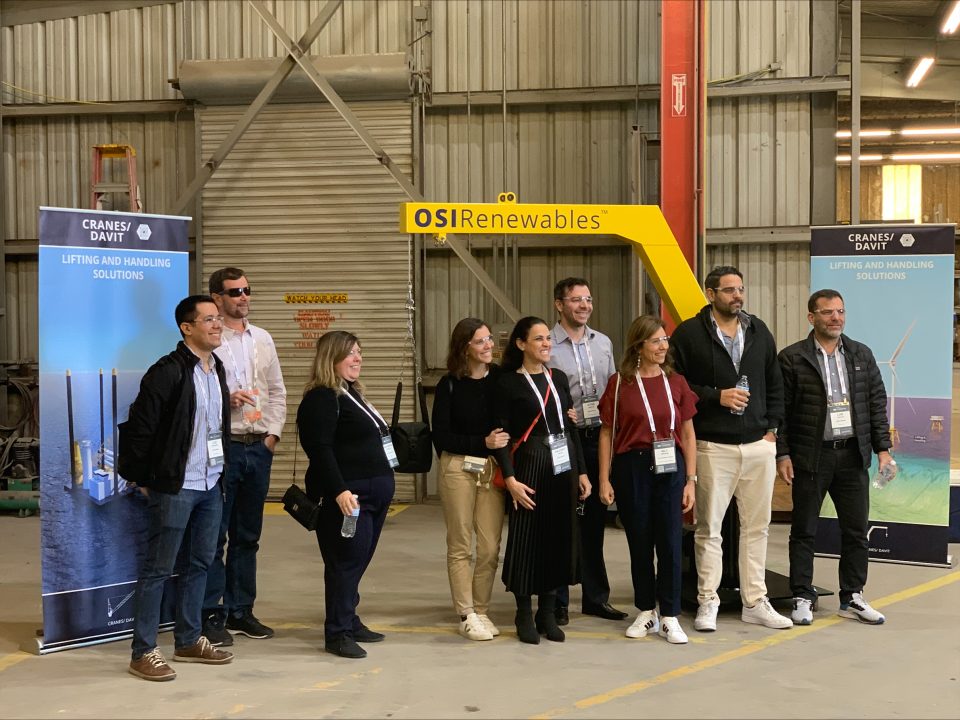
Cenac Leads in Vision, Tradition & Building a Future
May 16, 2018
Franks Continuing to Expand, Serve the Community
May 16, 2018BY COLIN CAMPO
The marine industry needs hands – trained hands.
Where does that training come from?
Fortunately for folks in the Houma-Thibodaux area, there are multiple educational centers with state-of-the-art equipment which can be used to train the next generation of those in the marine industry.
NICHOLLS HAD INDUSTRY SUPPORT
While the oil field is not seeking as many new mariners as it did during the boom, shipping companies are still grabbing up fresh prospects
According to Dr. Ken Chadwick, Department Head of management and marketing at Nicholls State University, enrollment for the maritime management program is slightly down since last year, but numbers still show that there’s a strong interest in the programs nonetheless.
“It’s stayed steady,” he said. “but we could really use more students.”
Nicholls offers a 4-year-degree, a Bachelor’s of Science in Management with a concentration in maritime. Chadwick says the program works intimately with the industry to provide skills required in the field.
“We’ve established a great relationship with our maritime program. It truly is a great example of cooperation between businesses and academia,” said Chadwick. “The courses and content were developed with input from the industry to expose them to critical knowledge necessary in the field.”
The concentration is fulfilled through five courses, and is AACSB accredited: the gold standard of accrediting bodies in college buisness accreditation, according to Chadwick. These include internships such as: safety, data analytics, personnel coordination, vessel coordination, and project management.
Chadwick emphasized that he felt this program was unique from any other in the country:
“We feel it’s unique to the country,” he began. “while there are others, this program focuses on what the industry calls the ‘brown water;’ whereas others focus on international shipping – what they refer to as the ‘blue water.’”
Chadwick explained that “brown water” is more specialized in oil and gas. “Blue water” is more specialized in shipping freight.
The program often lines up jobs for students before they have even graduated, said Chadwick. This year alone, Chadwick says he’s helped to place graduates at businesses all around the Gulf South.
The program is entirely funded by industry support. Chadwick said there are several dozen in total, but named Edison Chouest, Bollinger, and SEACOR Marine as having been around since its founding.
Nicholls’ maritime program was started in 2013 as a way to answer a labor shortage. While local technical colleges trained boat workers and captains, there was no local training ground for the white-collar managers of marine business. A collection of regional marine powerhouses, working with the South Central Industrial Association, developed the curriculum with Nicholls and provided money for the program’s first five years of operation. Chadwick said the marine program has received additional funds from SCIA, as well as the Lafourche Oilman’s Association and shipping company Archer Daniels Midland for the program to keep going well beyond 2018.
“We’re still pretty set financially for the foreseeable future,” Chadwick said.
While so much of Terrebonne and Lafourche parish is dependent on the energy sector, there are still other opportunities nearby for NSU marine graduates. According to Chadwick, many students have been finding jobs with shipping companies on rivers, as those businesses have not been hit as hard by the oil glut. As the employment successes of those students show, the industry is always looking to tap the talent pool for gifted young managers.
SLCTC CONTINUING TO PREPARE THE NEXT GENERATION
After more than 55 years wandering the Bayou Region from building to building, SCLTC’s marine program finally has a place it can call its own.
Last year, the technical college’s maritime school moved out of SCLTC’s main campus in Morgan City and headed down the road to a brand-new building built specifically for marine studies. The marine campus features classrooms and simulators inside while outside features a variety of hands-on courses, from a firefield to lifeboats and ship decks for students to train on.
The new campus comes as SCLTC has taken on a larger role in marine training in the Bayou Region. Previously, SCLTC and Fletcher Technical Community College had run separate marine industry training courses before recently being married together as complementary courses. As of July 2016, however, Fletcher’s marine program was finished and marine training was consolidated at SCLTC.
Seafaring students looking to get their next level of certification can take courses at either SCLTC’s Morgan City or Houma campuses, depending on their schedules. Carl Moore, assistant dean of the marine program, said SCLTC provides training for all levels of marine labor, from greenhorns just starting to sea captains maintaining their certifications. Moore said many companies prefer those wishing to join a boat to come in and at least get some work at SCLTC before hitting the waters.
“The industry doesn’t want to send a person out there green without any type of training. They actually want to get them in here, get them aware of these classes, so when they go out there they’re not going to be a hindrance,” Moore said.
Most marine students at SCLTC are not receiving a two or four-year degree, although Moore said the school is working with a consortium to take their courses and a student’s seatime and move it towards a degree. However, all seafarers must get the proper training and certification, combined with that time on a boat, to be eligible to move up a position.
Most of the students coming to SCLTC are already experienced in the maritime industry, according to Moore. He estimated that 90 percent of his students to be employed and the average age of a student to be about 30 years old. Moore said attendance has dropped off during the oil and gas downturn, particularly among new hires, but now more experienced mariners are coming back to either upgrade their license or change their certification to work in another field.
“You have to change, you have to be able to evolve, and that’s one of the things the school has been able to do, is to evolve,” Moore said.
Evolve Moore’s marine program has and continues to do so. SCLTC has a $500,000 vessel simulator, with a full, 360-degree view, digital tracking and steering systems. Students can drive vessels up and down rivers and in the Gulf of Mexico for hours on end while an instructor monitors their progress, and can change the scenario with a click, just outside the room.
“We like for them to ride for a couple of hours then send a tugboat up behind them to run them over when they get comfortable, because that’s how it happens in the real world,” Moore said.
On the outside, the marine campus in Morgan City has a bunch of hands-on amenities for students. The technical college receives lots of input from the industry, and many courses are created at the behest of specific companies, who not only tell SCLTC what they want but then provide them with the proper equipment to teach the course. The college has a firefield as well as a flash-over unit for students to learn how to put out fires. There is a deck overlooking Bayou Bouef for students to make open-water dives and repair a flange in zero visibility. There are also sample ship decks, complete with cranes so prospective mariners can fully practice loading containers onto ships. There are also lifeboats, for both offshore and inshore boats, as well as a pool to learn water survival. Moore said Cenac Marine Services is refurbishing an entire oil barge where students at the Houma campus can learn to be tanker men, due to be finished within a few weeks.
All of these amenities are part of the larger emphasis on hands-on experience at SCLTC, moving away from memorizing tests and instead moving to real, applicable skills. Moore said getting students comfortable in those real-life situations gets them much more ready to handle the jobs on a boat. That comfortability makes things run smoother for those boat businesses, but it also means everyone involved is safer.
“Even though the economy is down, safety is first when it comes to their employees. They want to make sure their employees, when they go to work, they’re able to do the job, and they’re able to make it home to their families,” Moore said.
The technical college’s marine program follows the Standards of Training Certification and Watchkeeping, standardized training rules for the International Maritime Organization. Someone labeled an able-bodied seafarer in England will have received the same training as someone in Morgan City. Moore said the continued input and contributions from industry partners shows the support they have for the training SCLTC is providing their workers.
“They know the integrity of the training here. Because we’re a state entity, we can’t just give certificates willy nilly,” Moore said. “They go through, as a student would, they know that every one of them are being taught what we said we’re going to test, so the integrity of our training in Morgan City and Houma is probably our brand. They know when they come to this facility, the equipment’s top notch, the instructors are top notch, so when the student comes here, the students realize where they are.”•










